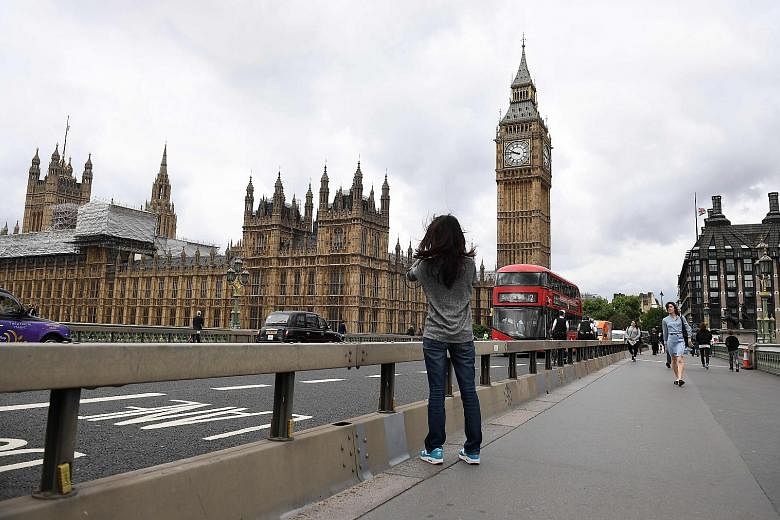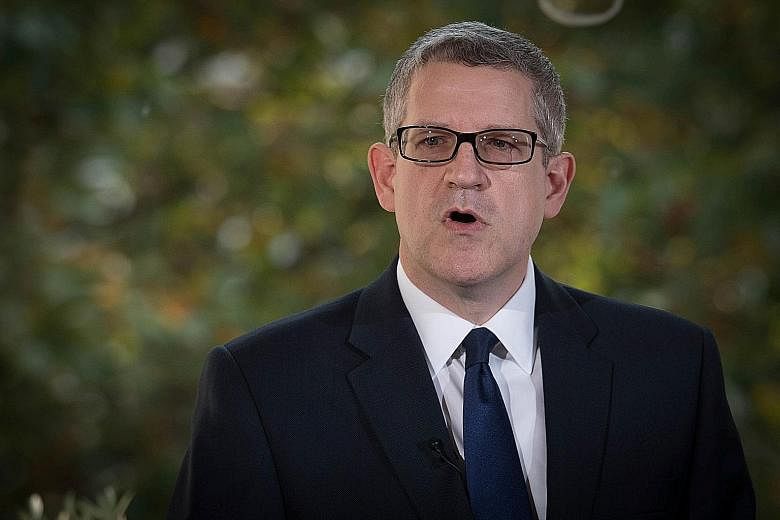LONDON • Britain faces the most acute threat ever from Islamist militants seeking to inflict mass attacks, often with spontaneous plots that take just days to bring to execution, the head of the domestic intelligence agency has said in a rare public speech.
After four militant attacks this year that killed 36 people in Britain - the deadliest spate since the London 7/7 bombings of July 2005, MI5 chief Andrew Parker said the threat was at the highest tempo he had seen in 34 years of espionage.
"The threat is more diverse than I have ever known: plots developed here in the UK, but plots directed from overseas as well, plots online, complex scheming and also crude stabbings, lengthy planning but also spontaneous attacks," he said.
"Attacks can sometimes accelerate from inception, through planning, to action in just a handful of days," Mr Parker said in a speech in London on Tuesday. The director-general of MI5 rarely gives public speeches. The last was in 2015.
Militants from the Islamic State in Iraq and Syria have been in retreat in the Middle East for two years: They lost Raqqa, their de facto capital in Syria, on Tuesday and have been forced back into an ever-diminishing foothold in the Euphrates River valley.
But as their territory, wealth and swagger decline, the militants have intensified online propaganda which has helped radicalise and inspire extremists to attack civilians in the name of Islam across Europe, the Middle East and Africa.
-
7
Terror plots thwarted in the last seven months.
500
Terror investigations.
379
Terror-related arrests in the 12 months to June.
Mr Parker noted that there had not yet been a large influx of British militants returning home from Syria and Iraq.
Britain has foiled 20 plots in the past four years, with seven Islamist attacks prevented in the past seven months, Mr Parker said.
He said there were 500 terror investigations involving 3,000 people who have been linked to militant activity, with intelligence services operating on a bigger scale due to the increase in threats.
"The scale at which we are operating is greater than ever before."
MI5, established in 1909 to counter German espionage ahead of World War I, is tasked with protecting British national security.
After a suicide bomber killed 22 people at a pop concert by US singer Ariana Grande in Manchester, MI5 began a review of how it handled intelligence on the bomber, Salman Abedi, who was known to the intelligence agencies.
Abedi was not among the 3,000 people under active investigation by MI5, although he was one of around 20,000 people known to have some links to extremism.
"When an attack happens, we are determined, using the harsh light of hindsight, to squeeze out every last drop of learning," Mr Parker said.
MI5, which employs around 4,000 people, says it does not have the resources to monitor every suspicious person. It works alongside the Secret Intelligence Service, or MI6, which operates abroad, and GCHQ, Britain's eavesdropping agency.
Britain has repeatedly demanded that Silicon Valley companies do more to suppress extremist content and allow access to online communication.
After British militants rammed a van into pedestrians on London Bridge and went on the rampage through packed bars, stabbing revellers in June, Prime Minister Theresa May said Britain must be tougher in stamping out Islamist militancy, and proposed regulating cyberspace.
Mr Parker said militants' abuse of the Internet could slow down the rapid pace of the hunt for attackers.
"This pace together with the way in which extremists can exploit safe spaces online can make threats harder to detect and give us a smaller window to intervene."
REUTERS, AGENCE FRANCE-PRESSE


